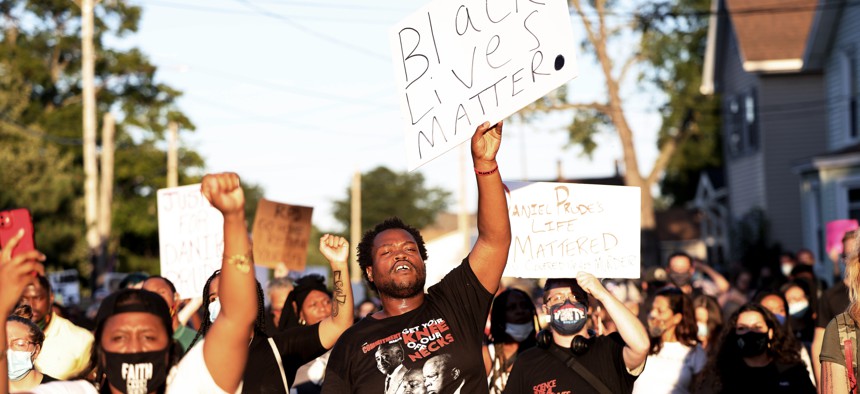Daniel’s Law supporters celebrate $2 million allocation in 2025 state Senate and Assembly one house bills for pilot program
The legislation seeks to change responses to mental health crises.

Marchers calling for justice over the death of Daniel Prude on September 03, 2020 in Rochester, New York. (Photo by Michael M. Santiago/Getty Images)
A group known as The Daniel’s Law Coalition is celebrating a $2 million allocation in the state Senate and Assembly’s one house budget bills for a pilot program that will change the response to people experiencing mental health or substance use crises.
Daniel’s Law (S.2398/A.2210) was proposed in early 2021 and is co-sponsored by Assemblyman Harry Bronson and state Senator Samra Brouk. The bill was proposed after the death of Daniel Prude, a Black man who was killed by police after his family called 911 for assistance during a mental health crisis in March 2020. The law proposes the creation of a State Crisis Emergency Response Council, consisting of 51% peers that will create the training, rules for calls to emergency dispatch, and responses to mental health emergencies.
The legislation, which is currently before the state Senate Mental Health Committee, seeks to also ensure that mental health professionals are the first responders to calls related to mental health. Members of the coalition pushing for the law include New York Lawyers for the Public Interest, VOCAL-NY, the New York Civil Liberties Union, NNLB, New York Association Psychiatric Rehabilitation Services, Free the People Rochester, National Alliance on Mental Illness – New York City Metro, New York State Psychiatric Institute, Friends of Recovery – New York, Partnership for Public Good, VOICE Buffalo and CCIT-NYC.
“This is only a piece of what is needed to make sure that we as a society, are doing the bare minimum for people with mental health diagnoses, it literally will save lives,” says Ruth Lowenkron, director of Disability Justice at New York Lawyers for the Public Interest.
“It's a way of helping people and the public recognizing that people with psychiatric disabilities and mental health issues, using the words interchangeably, can be assisted simply by having a well trained peer responding, a peer who's been there, done that, and knows how to de-escalate,” Lowenkron told New York Nonprofit Media. “And I think that in and of itself shows you mental health is just not that scary thing.”
The law is modeled after an Oregon initiative known as CAHOOTS (short for Crisis, Awareness Helping Out On The Streets), a crisis intervention program that does not rely on police and instead enlists mental health workers to de-escalate crisis situations. The program has a 35-year track record and has had no reports of serious injuries. Other cities using the model include Los Angeles, San Francisco, New Haven and Denver.
“This will have a very important effect on moving Daniel’s Law along so it will show New Yorkers, it will show the legislators, how things can be done in New York. We are confident that what can be what has been done across the country can easily be brought to New York. But we know that there's no better way of proving it to the legislators, to the public, than to have that kind of a pilot.” said Lowenkron.
